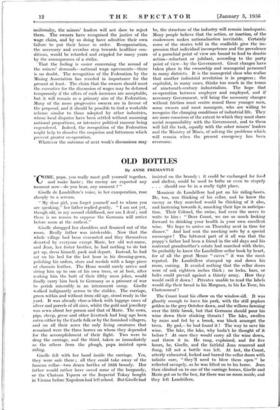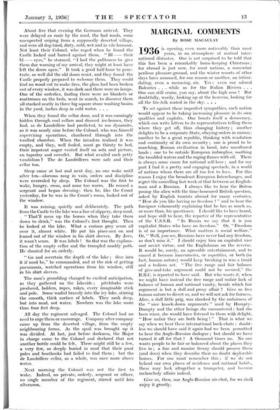OLD BOTTLES
By ANNE FREMANTLE
TOME, papa, you really must pull yourself together, and make haste ; the enemy are expected any moment now—do you hear, any moment ? "
Ciselle de Landrillere's voice, in her exasperation, rose sharply to a scream.
"My dear girl, you forget yourself and to whom you are speaking," her father replied gently. "I am not yet, though old, in my second childhood, nor am I deaf ; and there is no reason to suppose the Germans will arrive before noon at the earliest."
Giselle shrugged her shoulders and flounced out of the room. Really father was intolerable. Now that the whole village had been evacuated and they themselves deserted by everyone except Marie, her old wet-nurse, and Jean, her foster brother, he had nothing to do but get up, dress himself, pack and depart. Instead, he had sat on his bed for the last hour in his dressing-gown, polishing his orders, stars and medals with a large piece of chamois leather. The Huns would surely arrive and string him up to one of his own trees, or at best, after n:aking him the butt of their filthy mess jokes, would finally carry him back to Germany as a prisoner of war to perish miserably in an internment camp. Giselle walked indignantly across to the stables. The carriage, green within and without from old age, stood ready in the yard. It was already choc-a-block with luggage cases of silver and parcels of all sizes, whilst the gold and jewellery was sewn about her person and that of Marie. The cows, pigs, sheep, geese and other livestock had long ago been eaten either by the Castle folk or by the famished villagers, and on all their acres the only living creatures that remained were the three horses on whom they depended for the accomplishment of their flight. Two were to drag the carriage, and the third, taken as immediately as the others from the plough, papa insisted upon riding.
Giselle felt with her hand inside the carriage. yes, they were safe there ; all they could take away of the famous cellar—two dozen bottles of 1833 brandy. Her father would rather have saved some of the burgundy, or the Chateau Yquem or the Imperial Tokay bought in Vienna before Napoleon had left school. But Giselle had insisted on the brandy : it could be exchanged for food and shelter, could be used to bribe or even to stupefy . . . should one be in a really tight place.
Monsieur de Landrillere had put on his riding-boots. He, too, was thinking of his cellar, and he knew the enemy as they marched would be thinking of it also, and hastening towards it, smacking their lips in anticipa- tion. Their Colonel, the swine, had even the nerve to write to him: "Dear Count, we arc so much looking forward to drinking your health in your own excellent wine. We hope to arrive on Thursday next in time for dinner." And had sent the mocking note by a special messenger The bitterest part of it all was that the puppy's father had been a friend in the old days and his maternal grandmother's estate had marched with theirs. So probably he knew the Landrillere cellar book by heart, for of all the great Meuse "caves" it was the most reputed. De Landrillere stamped up and down his room, cursing. It availed nothing that the cellar doors were of oak eighteen inches thick ; no locks, bars, or bolts could prevail against a thirsty army. How they would swill it down ! Privates unable to read the labels would dip their bread in his Margaux, in his La Tour, his Chateauneuf !
The Count leant his elbow on the window-sill. It was ghastly enough to leave his park, with the still poplars golden in the grey October dawn, and the willows fawning over the little brook, but that Germans should pour his wine down their stinking throats ! The lake, swollen by rains and fed by a brook, was black amongst the trees. By gad,—he had found it ! The way to save his wine. The lake, the lake, why hadn't he thought of it before ? At once they would carry all the wine down, and throw it in. He rang, explained, and for five hours, he, Giselle, and the faithful Jean removed and flung, till not a bottle was left. At last, the Count, utterly exhausted, locked and barred the cellar doors with infinite care, "they'll need to blow them open" he reflected savagely, as he was lifted on to his horse. Jean then climbed on to one of the carriage horses, Giselle and Marie got on to the box, for there was no room inside, and they left Landrillere. About five that evening the Germans arrived. They were delayed en route by the mud, the bad roads, some unexpected sniping from a supposedly deserted village, and were all dog-tired, dirty, cold, *et and in vile humour. Not least their Colonel, who raged when he found the Castle locked and barred against them. " Bl— their bl— eyes," he stormed, "I had the politeness to give them due warning of my arrival, they might at least have left the doors open." It took a good half-hour to pene- trate, so well did the old doors resist, and they found the Castle properly prepared to welcome them. They could find no wood cut to make fires, the glass had been broken out of every window, it was dark and there were no lamps. One of the orderlies, fmding there were no blankets or mattresses on the beds, went in search, to discover them all stacked neatly in three big square stone washing basins in the yard, inches deep in cold water. . . .
When they found the cellar door, and it was cunningly hidden through coal cellars and disused ice-houses, they had, as de Landrillere had predicted, to use dynamite, so it was nearly nine before the Colonel, who was himself supervising operations, clambered through into the vaulted chamber. When the invaders realised it was empty, and they, well fooled, must go thirsty to bed, their impotent anger vented itself on sofa and picture, on tapestry and coverlet. But what availed such petty vandalism ? The de Landrilleres were safe and their cellar too.
Sleep came at last and next day, no one woke until after ten--alarums rang in vain, orders and discipline were overruled by sleep. The Colonel was the first to wake, hungry, cross, and none too warm. He roused a sergeant and began dressing: then he, like the Count yesterday, for he was in the Count's room, looked out of the window.
It was raining, quietly and deliberately. The path from the Castle to the lake was a line of slippery, deep mud.
"That'll mess up the horses when they take them down to drink," was the Colonel's first thought. Then he looked at the lake. What a curious grey scum all over it, almost white. He put his pince-nez on and leaned out of the window in his shirt sleeves. By Jove, it wasn't scum. It was labels ! So that was the explana- tion of the empty cellar and the trampled muddy path. He shouted for an orderly.
" Go and ascertain the depth of the lake ; dive into it if need be," he commanded, and at the risk of getting pneumonia, watched operations from his window, still in his shirt sleeves.
• The men's grumbling changed to excited anticipation, as they gathered on the lakeside ; pitchforks were produced, ladders, ropes, rakes, every imaginable stick and pole. Some waded bravely into the icy lake, stirring the smooth, thick surface of labels. They sank deep, but into mud, not water. Nowhere was the lake more than four feet deep.
• All day the regiment salvaged. The Colonel had no need to urge them or encourage. Company after company came up from the deserted village, from the empty neighbouring farms. As the spoil was brought up it Was divided. At last, just before darkness, the Major in charge came to the Colonel and declared that not. another bottle could be felt. There might still be a few, a very few, so deeply buried in mud that their punt poles and boathooks had failed to find them ; but the de Landrillere cellar, as a whole, was once more above Water.
.. Next morning the Colonel was not the first to wake. Indeed, no private, orderly, sergeant or officer, no single member of the regiment, stirred until late afternoon,











































 Previous page
Previous page